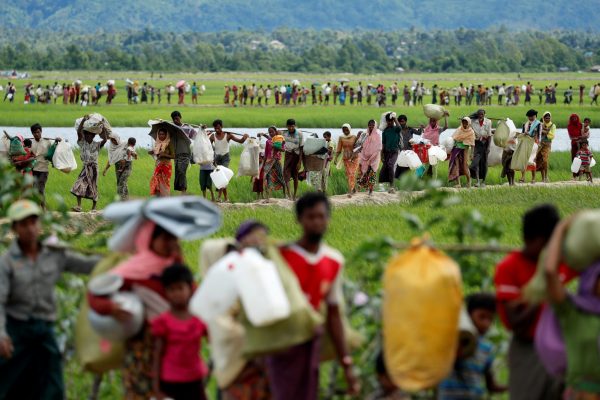Myanmar authorities have said that they are prepared to take back the refugees in accordance with a November 2017 bilateral agreement with Bangladesh. But many Rohingya are reluctant to subject themselves to verification or to return without certain guarantees.
With conditions in the camps worsening, one big question is what ASEAN can or should do to address the crisis.
Singapore is currently mid-way into its chairmanship of ASEAN. When ASEAN leaders met in April 2018, they issued a carefully worded statement on the repatriation issue.
They encouraged the Myanmar government to implement recommendations of the Advisory Commission on Rakhine State to ‘bring about peace, stability, the rule of law, to promote harmony and reconciliation among the various communities, as well as to ensure sustainable and equitable development in Rakhine State’. This language was echoed in a joint statement released after the ASEAN Foreign Ministers’ Meeting on 2 August.
But in the face of unresolved humanitarian disasters and continuing international outrage, ASEAN needs to go beyond these encouraging noises to consider seriously how it can help Myanmar.
ASEAN cannot hide behind the ‘no interference’ principle. Working with or alongside the Myanmar government is not interference. Former Indonesian foreign minister Marty Natalegawa recently noted that just because an issue is considered an internal matter ‘does not mean there is no potential for regional cooperation’.
ASEAN must work with the government of Aung San Suu Kyi. She needs to get past her old annoyances with ASEAN leaders for engaging the preceding military government when, under house arrest, she was advocating for sanctions on Myanmar. And she must realise that it is better for Myanmar to involve ASEAN countries. Several of them are host to earlier waves of Rohingya refugees and all of them would be affected if Myanmar were to continue to suffer international abrogation.
Rakhine is one of the poorest, least developed states in Myanmar. It has a poverty rate of 78 per cent — more than double the national average. Widespread poverty, poor infrastructure, lack of employment opportunities and perceived injustices in Rakhine have created conditions ripe for cleavages between the Rakhine Buddhists and the Muslim Rohingya to be exploited. To make matters worse, Rakhine State, like neighbouring Bangladesh, is vulnerable to natural disasters.
The crisis resides not only in the refugee camps in Bangladesh. It lies in a situation where two million ethnic Rakhine are poor and feel marginalised in their own environment.
Their future is as uncertain as that of the majority ethnic Rakhine, mired in low socio-economic development and with limited or no access to essential basic services, including medical care. Something needs to be done to change the situation on the ground in Rakhine, not just in the refugee camps in Bangladesh.
The Rakhine crisis is a multifaceted one that encompasses a humanitarian dimension, as well as security and developmental ones. These are all known issues. As noted by Kofi Annan in his report of the Advisory Commission on Rakhine State, unless these challenges are addressed, further radicalisation in both communities is a real risk.
Suu Kyi established the Union Enterprise for Humanitarian Assistance, Resettlement and Development in Rakhine to provide humanitarian assistance, help with repatriation, resettlement and rehabilitation efforts, bring development to Rakhine State and establish a durable peace. She is aware that any durable solution must engage all communities in Rakhine and, above all, she wants her fellow citizens to come forward.
As Chairperson of the Union Enterprise, she leaves the door open for international organisations and other governments to offer help. ASEAN foreign ministers, her counterparts, can engage her directly to offer concrete assistance.
There are mechanisms in place to do this within ASEAN. There is the Coordinating Centre for Humanitarian Assistance on Disaster Management (AHA), which is already working with the Myanmar government to deliver humanitarian assistance. But its resources are miniscule and its actions have so far been limited. Last year, AHA distributed kitchen kits and food relief supplies to displaced communities in Rakhine State. It can be resourced and empowered to do more.
There is also the ASEAN Defence Ministers Meeting (ADMM) and ADMM-Plus. The ADMM is the only international structure that involves, rather than isolates, the Myanmar military — a key, indeed critical, player. The ADMM can be better leveraged to negotiate sustained medical access and other help to meet the needs of Rakhine. The situation in Rakhine must be stabilised for enduring peace to stand a chance.
Just as it did in 2000–01 when ASEAN devised the multimillion-dollar Initiative for ASEAN Integration, aimed at closing the gaps between the original ASEAN six and the CLMV countries (Cambodia, Laos, Myanmar and Vietnam), ASEAN can again exercise real leadership by working with Myanmar to set up a plan to stabilise and develop Rakhine State.
It is in ASEAN’s own interest to do so, or the Rohingya and Rakhine State crises will continue to be a burden to ASEAN efforts at regional integration.
Kang Siew Kheng is a Senior Fellow with the S Rajaratnam School of International Studies (RSIS), Nanyang Technological University, Singapore.
A version of this article was first published here on RSIS.

